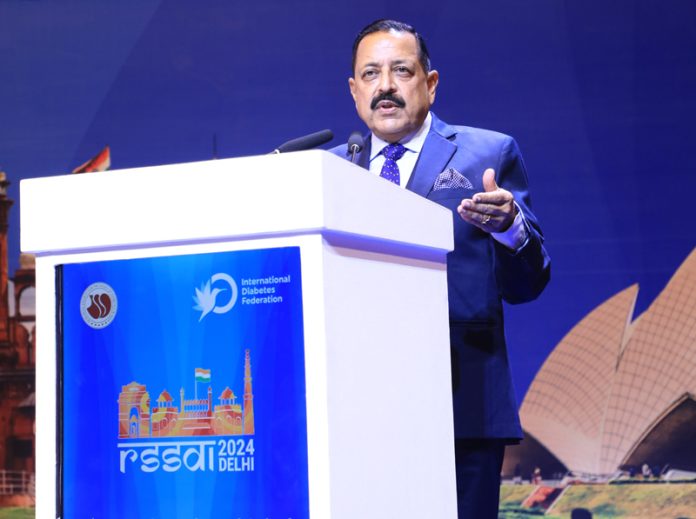
Excelsior Correspondent
NEW DELHI, Nov 15 : Union Minister Dr. Jitendra Singh, a nationally acclaimed Professor and Diabetologist, inaugurated the International 52nd Annual Conference of the Research Society for the Study of Diabetes in India (RSSDI) today, advocating proactive Diabetes prevention before the symptoms appear and in pre-diabetic stage. This may help avoid damage to vital organs like kidneys, heart etc, he said.
Speaking to a distinguished audience of healthcare professionals and diabetes experts from across the globe, the Minister emphasised the importance of pre-emptive strategies in preventing diabetes before symptoms develop, particularly among young people and pregnant women. His address highlighted the urgency of tackling India’s rising diabetes burden and the essential role of early intervention in reducing its impact on public health.
Dr Jitendra Singh called for strict preventive measures, particularly in the young and the pregnant women.
“Diabetes-related complications often begin before symptoms are visible, causing silent damage to vital organs,” Dr. Jitendra Singh stated. He called for heightened awareness and prevention efforts, especially for Type 2 diabetes, targeting healthcare providers and the public alike. During his remarks, he also referred to the concept of “primordial control” during pregnancy, an approach focused on managing glucose levels from early stages to foster healthier conditions for the developing child, potentially reducing hereditary risks for diabetes in future generations.
The conference also saw the release of the RSSDI report, which addresses India’s escalating diabetes , with over 101 million individuals diagnosed and an additional 136 million in prediabetic stage. With rural areas swiftly catching up to urban diabetes rates, it highlights how lifestyle changes and limited healthcare access are contributing to this troubling trend. With a national diabetes prevalence of 11.4%, it calls for urgent intervention, emphasising that targeted community-focused prevention strategies are critical to slowing the spread of diabetes across both rural and urban populations.
In response to these growing challenges, the RSDI proposes a comprehensive approach that includes expanding telemedicine services, improving rural healthcare facilities, and advocating policies that support diabetes care under national insurance schemes. RSSDI also underscores the importance of culturally adapted dietary and lifestyle guidelines to make diabetes management accessible and effective, accounting for India’s regional diversity. Further, the organisation recommends monitoring trends and direct interventions, aiming for more targeted and impactful outcomes in diabetes care.
The event at New Delhi’s Yashobhoomi convention centre, which saw the participation of International Diabetes Federation President, Prof Peter Schwarz, drew over 20,000 participants and featured keynote addresses, interactive workshops, and plenary sessions, fostering discussions on diabetes prevention, clinical care, and innovative public health strategies.

